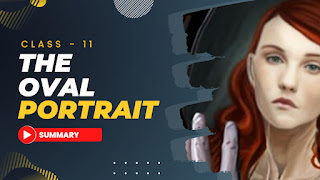The Selfish Giant: Class 11 English Exercise
UNIT - 1.1 THE SELFISH GIANT
Oscar Wilde (1854-1900) was an Irish wit, poet, novelist, and playwright. Wilde was born of professional and literary parents. His father, Sir William Wilde, was an ear and eye surgeon, who also published books. His mother was a revolutionary poet and an authority on Celtic myth and folklore. He published a book of poems, lectured in the United States and Canada on the new "English Renaissance in Art" and interior decoration, and then returned to London where he worked prolifically as a journalist.
🔆 Understanding the text
Answer these questions.
a. Where did the children used to play?
Ans: The children used to play in the Giant's garden.
b. What did the Snow and the Frost do to the garden?
Ans: The snow covered the grass with its large white coat and Frost painted all the silver trees.
c. What did the giant hear when he was lying awake in bed?
Ans: The giant heard beautiful music when he was lying awake in bed.
d. Why do you think spring never come to the giant's garden?
Ans: I think the spring season never come to the giant's garden because of his selfishness and his restriction on the children to play there by building the great wall.
e. How did the giant realise his mistake?
Ans: He realised his mistake when the kids stopped coming to the garden, and the garden never get spring.
🔆 Reference to the context
A. Read the extracts given below and answer the questions that follow.
a. "How happy we were there!" they said to each other.
i. Where does 'there' refer to?
Ans: 'There' refers to the giant's garden where children used to play after school.
ii. What does they refer to?
Ans: They refers to the children who used to
come and play in Giant's garden after school.
iii. Why are they saying so?
Ans: They are saying so because they aren't allowed to play in the giant's garden.
b. "I have many beautiful flowers," he said: "but the children are the most beautiful flowers of all".
i. Who is the speaker?
Ans: The speaker is an old and feeble giant who keeps on watching the children at their play sitting on his armchair.
ii. Who is he speaking to?
Ans: He is speaking to himself admiring his garden.
iii. Who are the children that the speaker is referring to?
Ans: The children that the speaker is referring to are the small and innocent school children who enjoy a lot in the giant's garden.
iv. Why is the speaker saying that 'the children are the most beautiful flowers of all"?
Ans: The speaker says "children are the most beautiful flowers of all" because children also bring joy and happiness in the garden like the flowers.
c. When the little child smiled at the Giant, and said to him. "You let me play once in your garden, today you shall come with me to my gorden, which is Paradise shortly afterwards, the happy giant dies. What is the coincidence of this event? Describe it in relation to this fairy tale.
Ans: The child returns in a garden nook the following Time. At this point in time, the giant is elderly and frail. As it turns out, the little kid once again favours the giant, who allowed him. to play in his backyard. The giant hasn't given up on the little kid yet. He's just here to meet the charmed kid, after all. The next day, he was found dead. It implies the child was a divine figure who took the giant to the eternal garden (heaven).
B. The story makes use of personification as one of the main figures of speech Cite three examples of personification from the story. What is the significance of the seasons personified in the story?
Ans: Personification is extensively used in the fairy story "The Selfish Giant to give things like flowers, snow, hail, and the north wind and ice human characteristics using the figures of speech such as metaphors, alliteration, and personification. It's easier for readers to grasp a story's main topic or moral when such themes or morals are personified. The author has given the things like wind, snow, spring, tree, bushes, and coldness human characteristics, allowing the audience to sympathise with them. It's a literary device employed to make ideas and words seem more meaningful.
C. This story can be read as a fairy tale, where the children, the seasons, the tree, the corner of the garden, the snow, the wind and the frost are all used as symbolism. Interpret those symbols.
Ans: Symbolism is a storytelling technique used to convey a merel message to the audience. This story has many symbols. At first 'The Selfish Giant' title itself is a symbol which depicts a very selfish giant. The children stond for innocence and pure love. Similarly, the tree symbolises perseverance as well as heaven in this particular garden area. Seasons also represent optimism, as well as the passing of time and of life itself. Sadness and anguish are symbolised by the ice, wind, and snowball.
D. Which figure of speech is used for winter, frost snow north wind, hail and little child? Who is the little child compared to?
Ans: For winter weather such as snow sleet, north wind and hail, various images as well as personification methods are employed Significantly, the Christian icon is depicted as a tiny child. We can figure out parallels between him and the historical figure of Jesus Christ.
🔆 Reference beyond the text
a. What is the main theme of the story?
Ans: Love and selflessness are the most recurring themes in the story 'The Selfish Giant'. We learn the importance of selfless love from the sale. It gives us wonderful memories and nice experiences, which enriches our hearts and lives. It shows the transformation of a person's character from one of evil to one of goodness. The lesson of the story is to share your love with others in order to get it in return.
b. Does God punish those who are cruel to children and very selfish?
Ans: Yes, God punishes mose who are cruel to childs and very selfish. As we saw in this story. Giant has really been so cruel to the childs and selfish that's why Spring never come in his garden. Snow and frost always remained in his garden, which symbolizes that negative atmosphere surrounding his garden when there were not any children.







